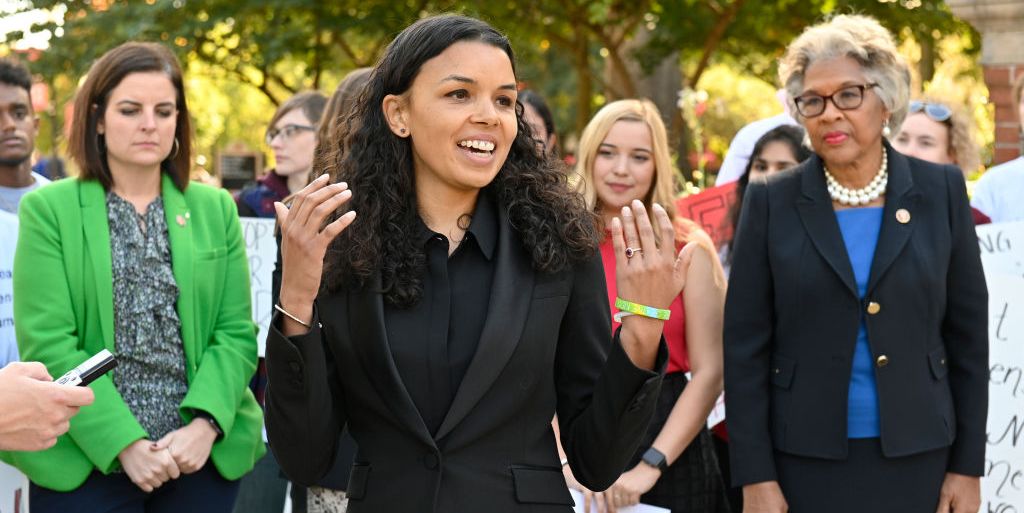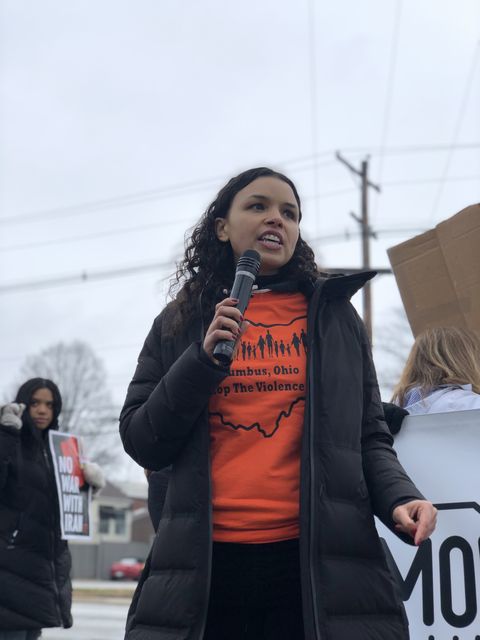Historically, women have needed to be convinced to enter politics. But since the 2016 presidential election, thousands of women announced their plans to run for public office. And we want them to win. So we’re giving them examples of women who have run. The point: You can too.
Morgan Harper wants you to see her primary race as normal. As a first-time candidate, Harper is running in Ohio’s third congressional district, challenging Rep. Joyce Beatty, a Democrat who’s been in office since 2013. A graduate of Stanford law school, Harper worked at the Consumer Financial Protection Bureau, and later at the Local Initiatives Support Corporation, a non-profit that invests in affordable housing.
Her campaign, which has been endorsed by the progressive PAC Justice Democrats, has already received media attention. She’s part of a wave of progressives candidates who’ve been criticized for challenging incumbent Democrats; Jonathan Weisman, a former deputy Washington editor at The New York Times, even tweeted that Harper was challenging an African-American incumbent without noting that Harper is also black. (He was later demoted due to his social media posts.)
But the 36-year-old says she takes it all in stride. Her district is solidly blue, which means the election will most likely be decided in the March 17th primary. Ahead, she explains why she decided to run.
Growing up, I was not a traditional politico by any means. My family was not super political. My mom immigrated to Reno, Ohio, from Trinidad. She didn’t even get to become a citizen until I was in my late 20s.
I was born in Columbus, Ohio, given up for adoption, and lived in a foster home as an infant. I was adopted and raised on the east side of the city, mostly living with my mom, paycheck to paycheck. Then I got this amazing opportunity. I got financial aid to go to this fancy college prep school. It woke me up to how unfair things can be. Whether your parents have money or what school district or neighborhood you’re born into can really determine the outcome of your life. It put me on this course to do something about it.
In high school, I was more focused on volunteerism and I thought, If I can get people out of their bubbles to see how unfair everything is, then they’ll see that the system isn’t right. By the time I got to college, I learned there was a thing called public policy and I realized, Oh, this is what’s controlling all of this. We actually designed this system, and I’ve got to do something to change the way it works. It’s been a process for me to get to the point of actually running for office. But ultimately, once I was in Washington D.C. after college, I made the connection that policy is controlled by politicians. You’ve got to be one of them if you’re going to be a final decision maker.
At the Consumer Financial Protection Bureau, I saw this is what the federal government can do when it’s given the mandate and resources to actually accomplish something. But it’s still not getting at the fundamental issue. Just tinkering with financial regulation, even when it’s a very bold regulation of an industry, is not going to solve the issue that people aren’t earning enough money, that they don’t have stability in their lives, often connected to things like housing and healthcare. We have to really rethink what we’re doing at the federal level and be a lot bolder if we’re going to address that issue.
I always wanted to come back to Ohio. I started really thinking about the housing issue in particular and saw how urgent the issue was, especially in central Ohio. We’re at a breaking point, and I just couldn’t sit at a desk anymore. I couldn’t pretend that what I was doing was enough. I felt like I understood the third district really well from my time there. It made me. I’m so grateful to that place, and if I wasn’t doing everything I could at this moment where it feels like we’re at a crossroads, I wouldn’t be able to look at myself.
I think 2016 woke a lot of us up to just how disenfranchised a lot of people are feeling. It wasn’t a surprise to me, but when you see how far people are willing to go in the face of that desperation, it’s like, Wow, we’re really so far from realizing a true American dream. Then in 2018, seeing other women, particularly women of color, that were willing to put themselves out there—without the party behind them, without being rich, just believing that they had a vision for their community and that they could win—was really inspiring.
When I was considering running, I got feedback like, Hey, we don’t disagree with your analysis, that the state of our communities is not strong, particularly in the black community. But you can’t do this because this is going to be political career suicide. You’ll never be able to get another job in Columbus, Ohio. They were saying I’d be going up against a political machine that crushes those who step out of line.
A lot of this power is maintained through keeping the electorate uninformed or misinformed. Once you start empowering people to care about the political process and recognize that it’s accessible to them, that can’t be stopped. That’s what we’ve seen throughout the campaign. Naysayers told me, Oh, Morgan, you’re going to get crushed, you won’t raise any money. Now we’ve raised over $550,000 without taking any corporate PAC money because they underestimate that real people from all over the country, including in our district, are willing to donate $10 a month. That was one of the things we saw in other elections that convinced me this was possible.
People said, Morgan, You’re going to do this and no one will care. No one will pay attention. That to me is an underestimation of how sick people are of the status quo. They aren’t going to accept another generation of leadership that is not moving with urgency to address the issues that are happening in the community.
I’m not unique in running this type of primary challenge. There’s hundreds of people running these types of races all over the country. There is a generational shift happening. We want democracy. Democracy is people participating in the political process. More participation is better, from my perspective. And if you’re doing your job, you have nothing to worry about. But where I’m coming from is, we see unmet needs in our communities. I think that we just have to normalize this type of race.
I’ve found that when you’re a woman running for office, people feel very entitled to say whatever they want in terms of feedback. And there’s almost zero assumption that you have any knowledge of what you’re doing. I’m told every other day, Are you old enough to be running for Congress? As a 36-year-old woman, that’s frustrating. We’re always told to use all the creams to stay looking young, but when you’re trying to do something political, it becomes a bit of a liability.
Luckily, I suppose, I’ve had a career of dealing with this, and it’s not all that different from what I’ve experienced in other professional environments. But it’s pretty wild. It’s an exercise in complete vulnerability and putting yourself out there.
I get a lot of comments on our campaign photo. Morgan, why are you not smiling in the campaign photo? Because I didn’t want to smile. Because it’s serious, and we have a lot of work to do. But Morgan, people like women that are smiling, a friendly appearance. OK, well this woman has a different message to send.
I truly feel privileged that I’m in a position to translate needs into a legislative agenda that I know I have a skillset to get done in Washington. This is the work of my life, and I just feel really lucky that I’ve gotten the opportunity. I’ve felt lucky pretty much since the day I was born that I’ve gotten this level of opportunity. But now to try to expand that opportunity to everyone who’s living in the third district is my ultimate vision.
We are winning every day—every day that I’m meeting someone who is 20, who cares about what I’m talking about. Let’s keep it going. I want to keep you excited. I want you to run for something. I am not doing this forever. I’m going to place term limits on myself, no more than four terms. I want somebody else to be ready to go.
This interview has been edited and condensed for clarity.

